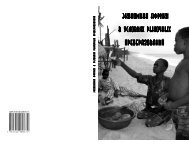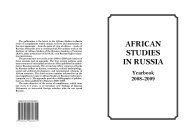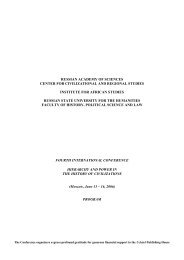L. Fituni, I. Abramova Resource Potential of Africa and Russia's ...
L. Fituni, I. Abramova Resource Potential of Africa and Russia's ...
L. Fituni, I. Abramova Resource Potential of Africa and Russia's ...
Create successful ePaper yourself
Turn your PDF publications into a flip-book with our unique Google optimized e-Paper software.
ments about scientific <strong>and</strong> technological cooperation, mutual encouragement<br />
<strong>and</strong> protection <strong>of</strong> investment, cooperation in the<br />
sphere <strong>of</strong> marine transport <strong>and</strong> avoidance <strong>of</strong> dual taxation. He also<br />
signed a treaty about the preferential customs duties, reduced from<br />
50% to 25% <strong>of</strong> the value. Another agreement dealt with export<br />
guarantees. In 1998, Russia <strong>and</strong> Egypt negotiated opening <strong>of</strong> a direct<br />
shipping line with ships <strong>of</strong> the ‘river-sea’ type, which made it<br />
possible to carry cargoes to the ports on the Volga, the Don <strong>and</strong> the<br />
Caspian. The Egyptians Co. <strong>and</strong> the administration <strong>of</strong> Nizhegorodskaya<br />
oblast (region) <strong>of</strong> Russia took part in the negotiation.<br />
A considerable progress was achieved in 1998 in the negotiation<br />
between Ingosstrakh, a Russian insurance company, <strong>and</strong> the Egyptian<br />
Company for Export Credit Guarantees, which signed an<br />
agreement about the guarantees against commercial risks in foreign<br />
trade. In early 1999, Russia presented to Egypt a draft longterm<br />
Program (road map) for trade, economic, industrial, scientific<br />
<strong>and</strong> technological cooperation. In March 2000, the Egyptian-<br />
Russian council for business cooperation was set up. It is headed<br />
by Ahmed Diqa, an Egyptian entrepreneur.<br />
In 1991–1993, the volume <strong>of</strong> Russia’s trade with Egypt drastically<br />
decreased, owing to the disintegration <strong>of</strong> the USSR. Most <strong>of</strong><br />
the Black Sea ports remained in Ukraine, which led to an increase in<br />
the cost <strong>of</strong> transportation <strong>of</strong> the exported <strong>and</strong> imported goods <strong>and</strong><br />
risk <strong>of</strong> damaging or losing cargoes. Another reason was payments in<br />
hard currency, reserves <strong>of</strong> which are quite limited in the state-run<br />
companies <strong>of</strong> both countries. The situation began to somewhat improve<br />
in 2000. The total volume <strong>of</strong> Russian exports reached the precrisis<br />
level.<br />
The increase in Russian exports to Egypt after 1993 was accompanied<br />
with some changes in its structure; its main feature was a<br />
high share <strong>of</strong> machines <strong>and</strong> equipment (33.4% in 1993), including<br />
aviation equipment (helicopters produced in Kazan <strong>and</strong> navigation<br />
<strong>and</strong> radio location equipment). Egypt was interested in purchasing<br />
Tu-204-120 aircrafts with RV-211-535 engines supplied by the<br />
Rolls-Royce <strong>of</strong> Britain <strong>and</strong> avionics supplied from the USA. This<br />
deal is financed by I. Kamel, an Egyptian businessman.<br />
164







